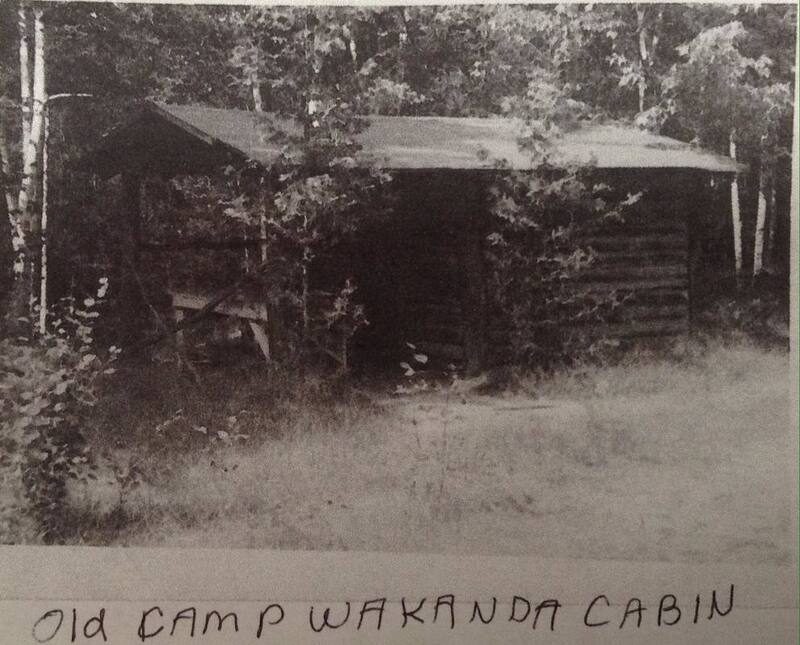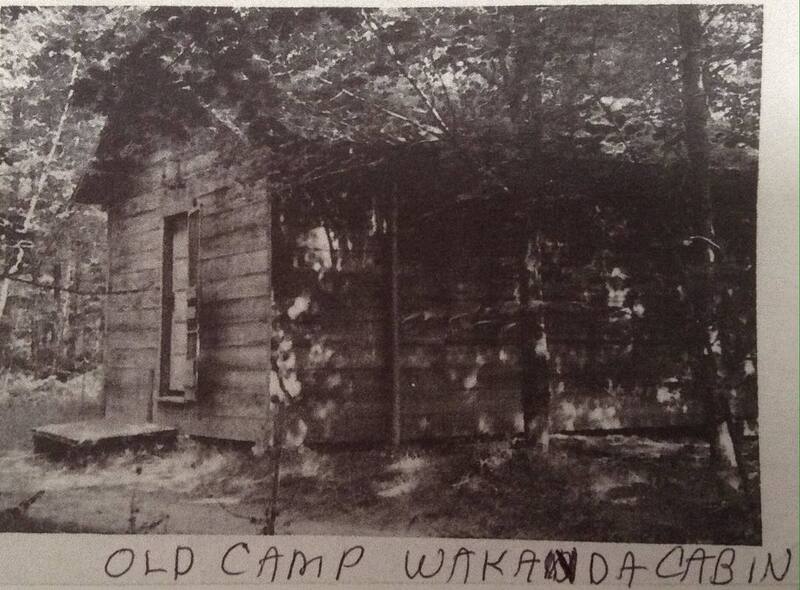The History of Camp WakandaFrom the beginning, the land we call Wakanda was formed by glacial activity and most likely roamed by Native Americans and early hunters. Part of the large virgin forests of Michigan, Wakanda is located in the north-central part of Michigan’s Lower Peninsula. It was also in the heart of the great timbering industry; an industry that stripped Michigan of nearly all of its virgin woodlands. In fact, one of the legends of Wakanda is that the narrow iron tracks that once carried railroad cars filled with timber still lie beneath the surface of the trail that runs from the main road to the northern part of the camp property. On these tracks, lumbermen of old rolled untold board feet of trees that helped build the homes and industries of Michigan and Chicago. Fortunately for us, the once wood covered, then barren lands, have returned to a stage resembling the forests of old.
Our recorded history of Wakanda ownership begins with a United States Land Grant of 1866. This land grant included not only the Camp property, but also many hundreds of acres beyond the borders of our Wakanda. Since that original land grant, the property went through numerous property transfers, including several times reverting to the State of Michigan for non-payment of taxes.
During the 1930’s, we know that the 160 acres of Wakanda, including the small lake called El Lake, was being used as a hunting camp. In May of 1941 six of Allen Park’s early families decided that the property would be ideal for a Boy Scout camp. The six families came together to purchase the property and deed it to the Allen Park Presbyterian Church. The total price paid for the property was twenty-one hundred dollars ($2,100).
An early history of the Scout Troop describes how Wakanda got its name. In 1953, the scouts had a contest to name what had been called “the boy scout camp.” A new scout --a “tender foot” -- Carlton Speck, (the son of Doctor Carlos Speck, one of the early sponsors and an original member of the Camp Committee) won the contest with the name “Camp Wakanda.” Wakanda derives from the name used by the Dakota Indians (which includes the Sioux tribes) for the spirit that resides in all living things. Other American Indian names with the same meaning are Wakan-Tanka, Wakan and Wakonda.
|
Think also of the memories that we carry forever: of the legend of “Swampy Sadie”, the laughter of “Broken Toe”, and the music of the campfires; of friendships made, childhoods grown and faiths strengthened; of community worship or private moments at Chapel Point. The beaver huts and stories of wildlife: bear, deer, porcupines, and eagles; all wonders of God’s world. Wonders that can’t be found in the city, but can be found in the memories and carried in the personalities of Wakanda’s campers… men, women, and children.
And when you are at Wakanda, take time to listen; be still and listen. Listen to the years, to the wind softly caressing the trees, to the waters of the lake lapping gently on the shore. Hear the echoes of the years; of laughter as children play and of prayers and music as people worship. Listen also to the crackles of the campfires and remember the dancing flames that bring camper’s thoughts to a special place. Listen and feel God’s presence, feel Wakanda, feel the Spirit. There are too many names to mention of people who have loved Wakanda and who gave of their time, talents and treasures to make Camp Wakanda a reality in our lives; so many people who live with Wakanda in their hearts. One needs to walk the property, to note the memorial plaques on buildings and walls and to reflect on the donations made by these individuals in the name of God’s ministry. And reflect on those who have given their works, and have gone to join the Saints in Heaven. How many stories? How many tears? How many prayers? Surely a love of children, of nature and of God is what led them to their works. Thank you God for those who had the vision and for those who had the commitment; without them it would not have been possible. Truly, the Spirit that resides in all living things resides in we who have camped there, worked there, and worshiped there. |
Allen Park Presbyterian Church (USA)7101 Park Avenue (between Cleveland and Harrison Avenues)
Allen Park, Michigan 48101 (313) 383-0100 Enter from Cleveland Avenue for church office. Church office hours:
For more info: [email protected]
|
APPC Fellowship Building6835 Park Avenue (between Garfield and Cleveland Avenues)
Allen Park, MI 48101 Camp Wakanda10396 Old State Road
Johannesburg, MI 49751 APPC Preschool (Weekday)Honeycomb Food Pantry313-383-0100, Ext. 0
honeycombfoodpantry.org |


